情态动词(复习)[下学期]
图片预览
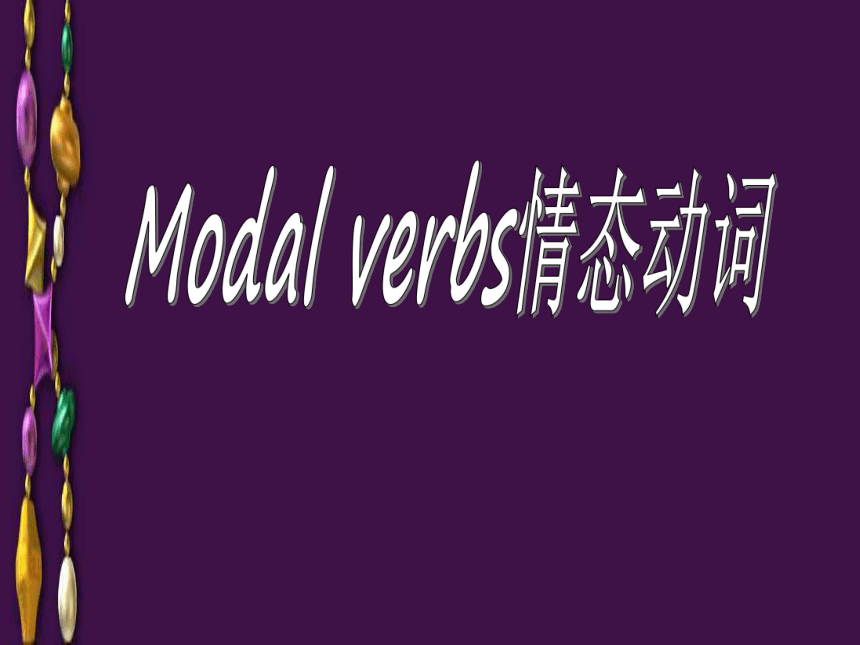
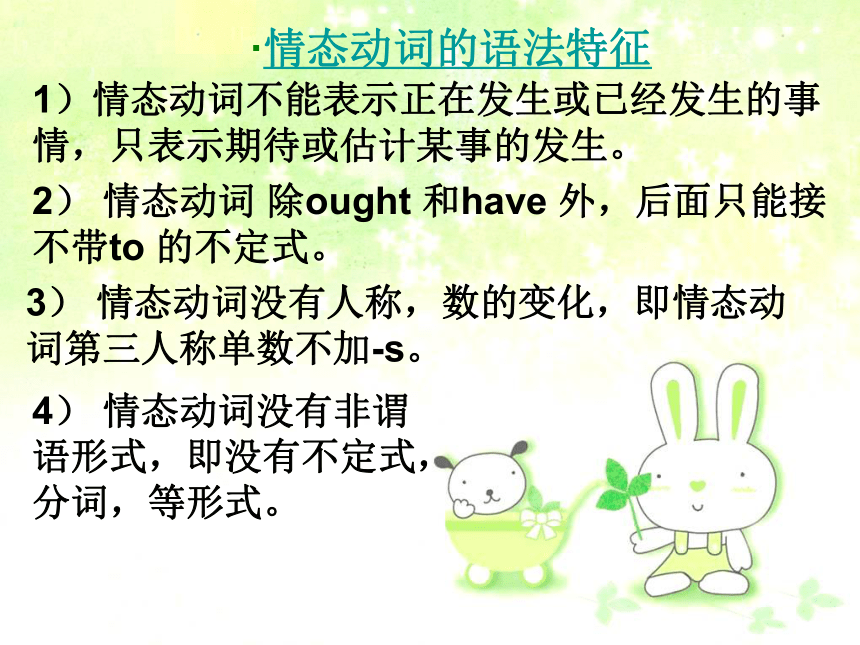
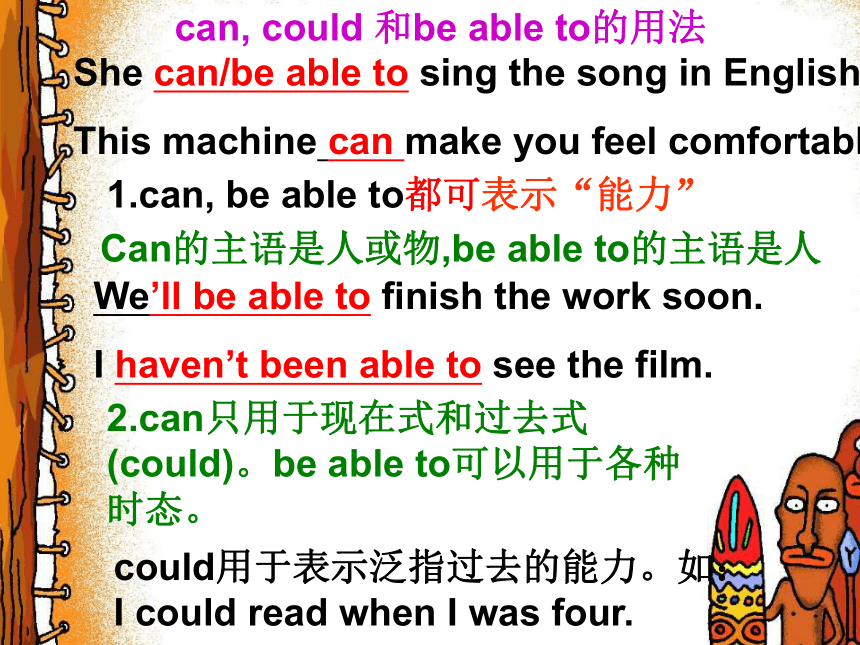
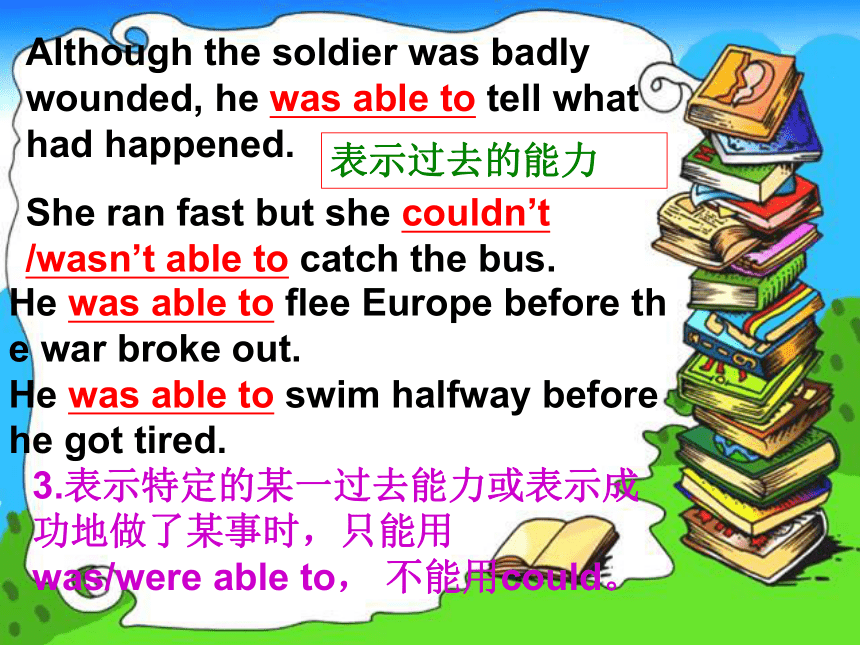
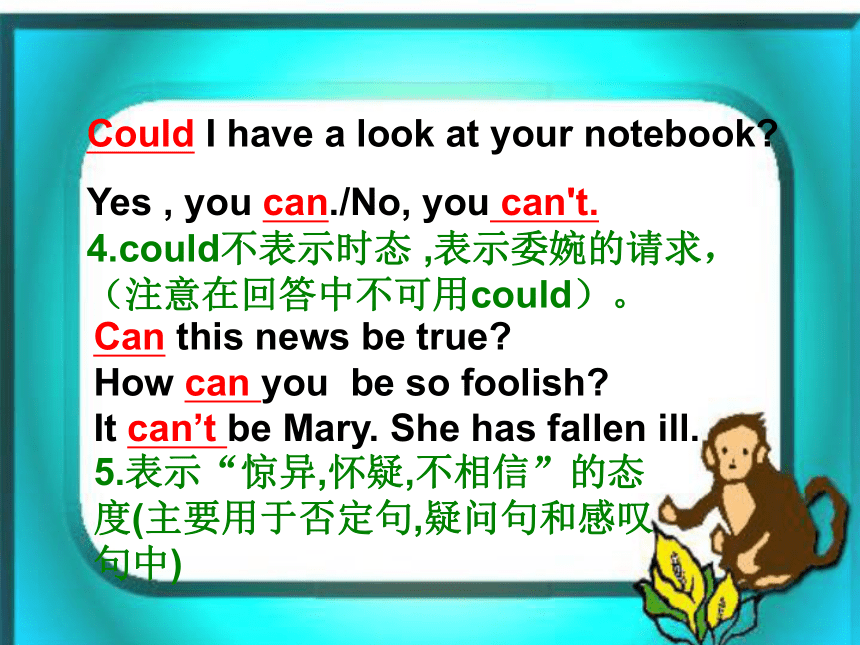
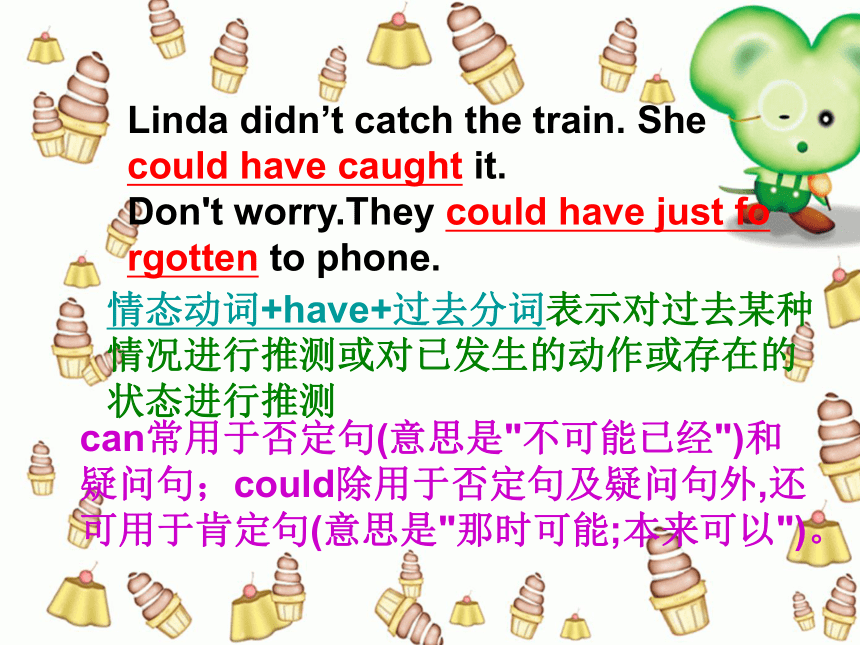
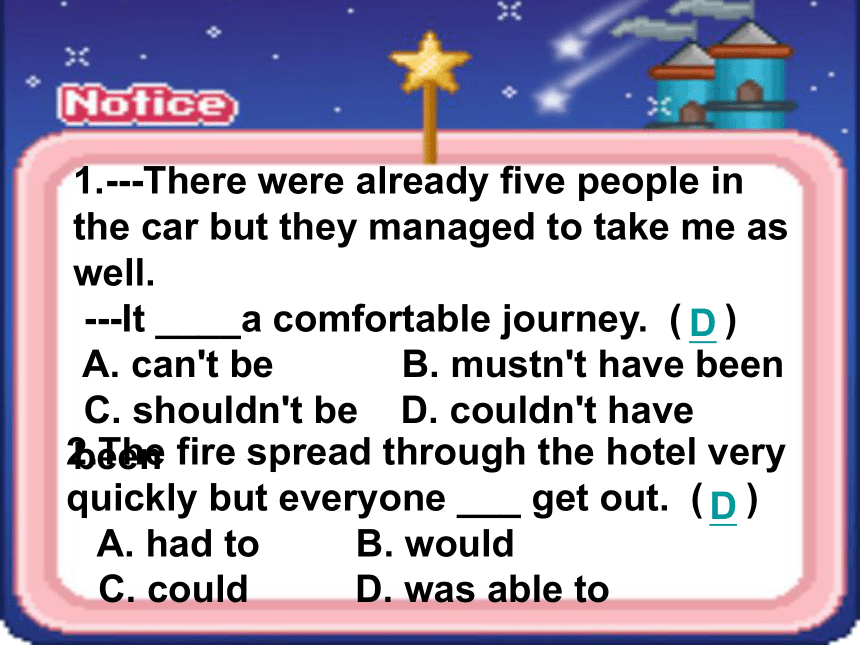
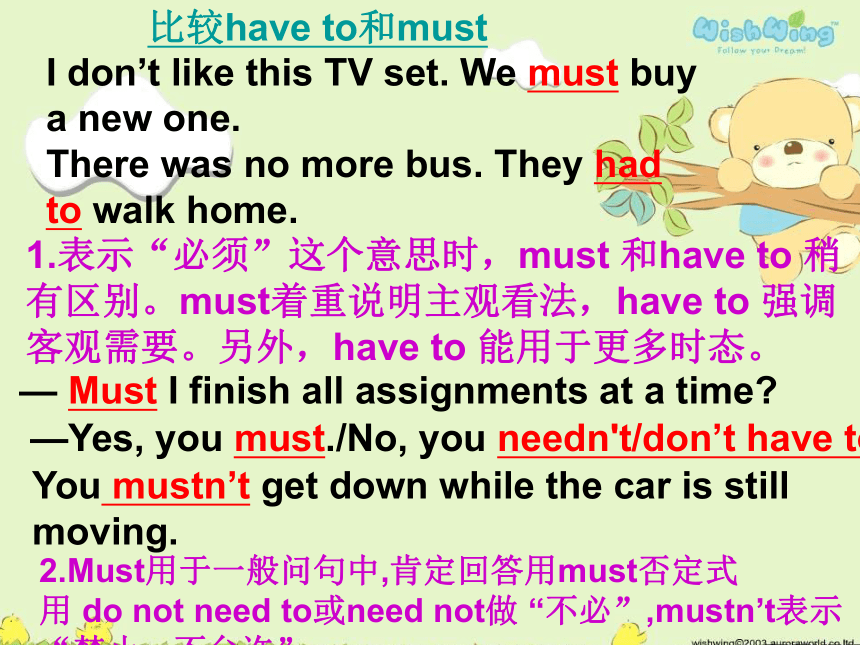
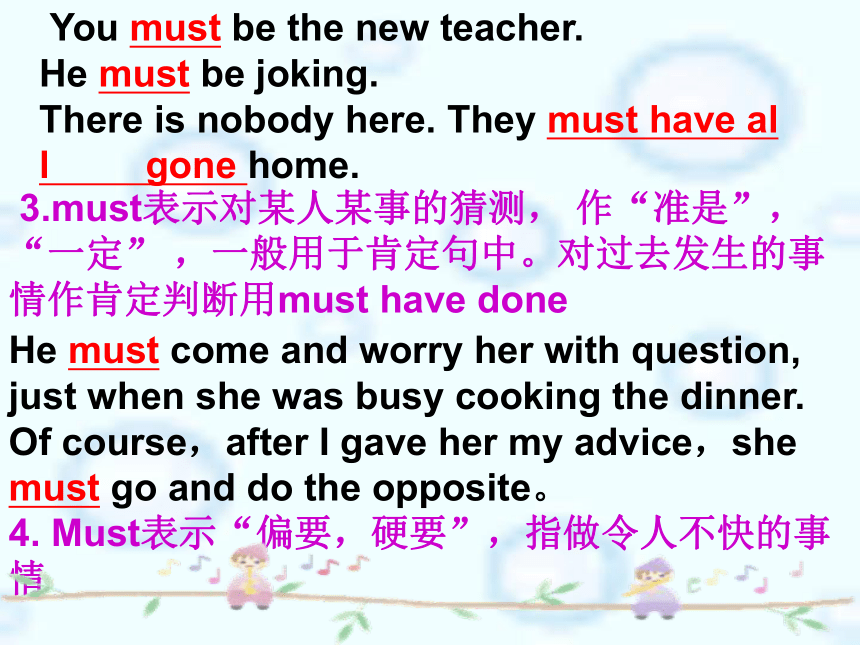
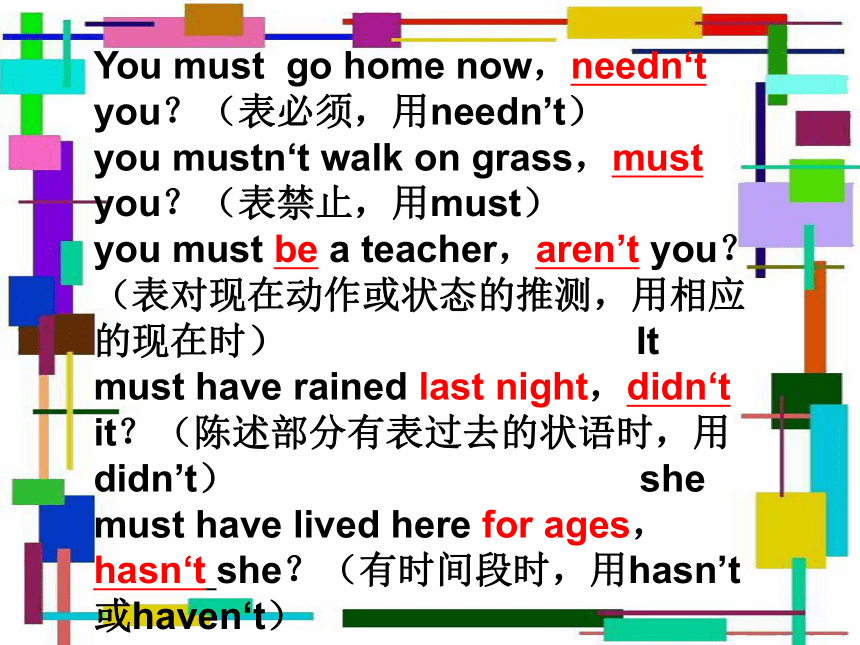
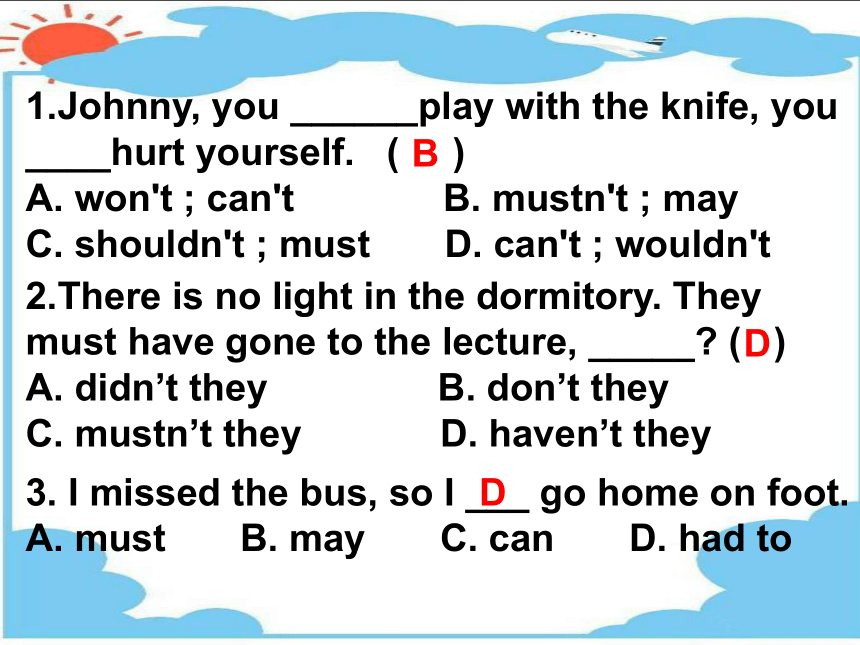
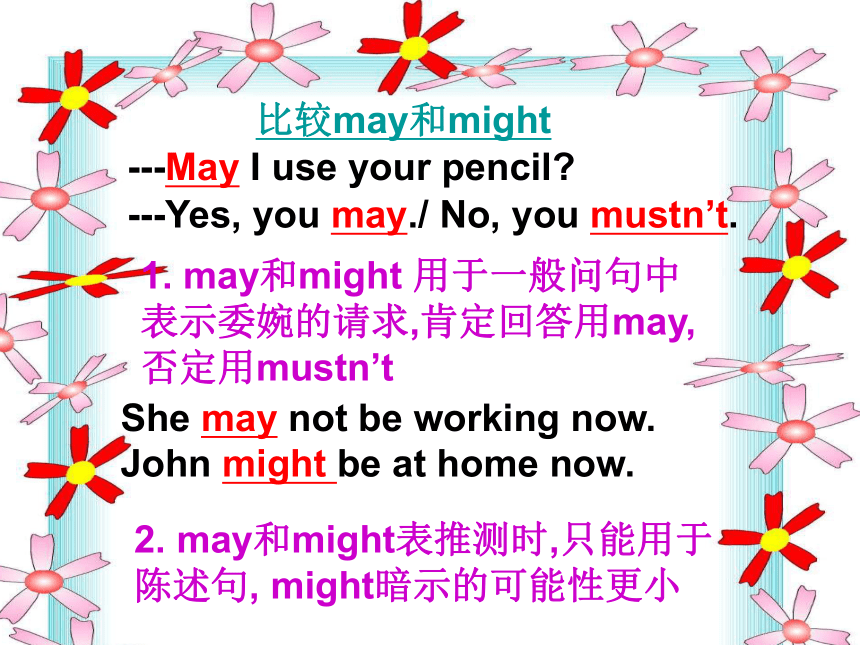
文档简介
课件52张PPT。Modal verbs情态动词·情态动词的语法特征1)情态动词不能表示正在发生或已经发生的事情,只表示期待或估计某事的发生。 2)?情态动词?除ought?和have?外,后面只能接不带to?的不定式。 3)?情态动词没有人称,数的变化,即情态动词第三人称单数不加-s。 4)?情态动词没有非谓语形式,即没有不定式,分词,等形式。 can, could 和be able to的用法She can/be able to sing the song in English.
This machine can make you feel comfortable.1.can, be able to都可表示“能力”Can的主语是人或物,be able to的主语是人 We’ll be able to finish the work soon.
I haven’t been able to see the film.2.can只用于现在式和过去式(could)。be?able?to可以用于各种时态。 could用于表示泛指过去的能力。如: I?could?read?when?I?was?four. Although the soldier was badly wounded, he was able to tell what had happened.
She ran fast but she couldn’t /wasn’t able to catch the bus.3.表示特定的某一过去能力或表示成功地做了某事时,只能用was/were?able?to,?不能用could。 He?was?able?to?flee?Europe?before?the?war?broke?out. ?? He?was?able?to?swim?halfway?before?he?got?tired. 表示过去的能力Could I have a look at your notebook?
Yes , you can./No,?you?can't. 4.could不表示时态 ,表示委婉的请求,(注意在回答中不可用could)。 Can this news be true?
How can you be so foolish? It can’t be Mary. She has fallen ill.5.表示“惊异,怀疑,不相信”的态度(主要用于否定句,疑问句和感叹句中)
Linda didn’t catch the train. She could have caught it. Don't?worry.They?could?have?just?forgotten?to?phone. 情态动词+have+过去分词表示对过去某种情况进行推测或对已发生的动作或存在的状态进行推测 can常用于否定句(意思是"不可能已经")和疑问句;could除用于否定句及疑问句外,还可用于肯定句(意思是"那时可能;本来可以")。 1.---There were already five people in the car but they managed to take me as well.
---It ____a comfortable journey. ( )
A. can't be B. mustn't have been
C. shouldn't be D. couldn't have been
D2.The fire spread through the hotel very quickly but everyone ___ get out. ( )
A. had to B. would
C. could D. was able to
D比较have?to和must I don’t like this TV set. We must buy a new one. There was no more bus. They had to walk home.1.表示“必须”这个意思时,must?和have?to?稍有区别。must着重说明主观看法,have?to?强调客观需要。另外,have?to?能用于更多时态。 ?— Must?I?finish?all?assignments?at?a?time? ??—Yes, you must./No,?you?needn't/don’t have to. You?mustn’t?get?down?while?the?car?is?still? moving. 2.Must用于一般问句中,肯定回答用must否定式用?do?not?need?to或need?not做?“不必”,mustn’t表示“禁止,不允许” ?You?must?be?the?new?teacher. ? He?must?be?joking. There?is?nobody?here.?They?must?have?all ?gone?home. ?3.must表示对某人某事的猜测,?作“准是”,“一定” ,一般用于肯定句中。对过去发生的事情作肯定判断用must have done He must come and worry her with question, just when she was busy cooking the dinner. Of course,after I gave her my advice,she must go and do the opposite。4. Must表示“偏要,硬要”,指做令人不快的事情You must go home now,needn‘t you?(表必须,用needn’t) you mustn‘t walk on grass,must you?(表禁止,用must) you must be a teacher,aren’t you?(表对现在动作或状态的推测,用相应的现在时) It must have rained last night,didn‘t it?(陈述部分有表过去的状语时,用didn’t) she must have lived here for ages,hasn‘t she?(有时间段时,用hasn’t 或haven‘t)1.Johnny, you ______play with the knife, you ____hurt yourself. ( )
A. won't ; can't B. mustn't ; may
C. shouldn't ; must D. can't ; wouldn'tB2.There is no light in the dormitory. They must have gone to the lecture, _____? ( ) A. didn’t they B. don’t they C. mustn’t they D. haven’t theyD3. I missed the bus, so I ___ go home on foot. A. must B. may C. can D. had toD比较may和might ---May I use your pencil?---Yes, you may./ No, you mustn’t.1. may和might 用于一般问句中表示委婉的请求,肯定回答用may,否定用mustn’tShe may not be working now. John might be at home now.2. may和might表推测时,只能用于陈述句, might暗示的可能性更小 She may/might have gone to the cinema. They may/might not have received our telephone.3.对过去发生的事情的可能性作出判断用may/might have done,用might比用may的可能性更小 May you succeed! May?God?bless?you! 4.may?放在句首祈使句,表示祝愿。 1. Peter ___ come with us tonight, but he isn’t very sure. A. must B. can C. may D. willC2. --- Could I call you by your first name? --- Yes, you____. A. will B. could C. may D. mightC3. Sorry, I ’m late. I ___ have turned off the alarm clock and gone back to sleep again. A. might B. should C. can D. willAshall ,should 和ought toYou shall do as I say. (命令) Tell him that he shall have the book tomorrow. (允诺) Nothing shall stop me doing it. (决心) 1.在陈述句中,shall用于二、三人称表示允诺、警告、命令、决心等。Shall I open the window for you?(征求意见) Shall he fetch some water for you?(请求)2.在疑问句中,用于一、三人称,用来表示请求或征求意见。Young people should learn how to use computers. Every citizen ought to obey law. You ought not to go.3. shoould常表示劝告、建议、命令,与ought to意义相近,但ought to多表示责任、义务,语气强烈。You should/ought to have told her the truth earlier. She shouldn’t have left without saying a word.4.should/ought to have done表示责备或批评,意为“本应该…但”,ought to的语气更强烈,用于否定则表示“本不该…但”They left at 5:30. They should get there now.5.Should用于可能性推测时,表“应该,很可能”1.--Excuse me, but I want to use your computer to type a report.
--You ____ have my computer if you don’t take care of it.
A. shan’t B. might not C. needn’t D. shouldn’tA2. ---When can I come for the photos ? I need them tomorrow afternoon.
---They _____be ready by 12 : 00 . A. can B. should C. might D. needB3. With so much work on hand, you ____to see the game last night. A. mustn’t go B. could have gone
C. shouldn’t go D. shouldn’t have goneDWill 和 wouldIf you will help me with my English, I will be very happy. I promised that I would do my best.1.will和would表示意愿、意志,可用于各种人称Will you tell him the news as soon as he comes back? Would you please speak again more slowly?2.在疑问句中,will用于第二人称,表示请求或征求意见,would则语气更委婉Fish will die out of water. The door won’t open. Often he would dress up like a rich man.3.表示现在或过去某种倾向或习惯性动作.---Would you change this bucket for another ? It ______ hold water.
--- OK. I’m really sorry.
A. won’t B. can’t C. didn’t D. doesn’tAneedI wonder if I need to leave a message. --- Need he start from the beginning? --- Yes, he must. --- No, he needn’t/doesn’t have to. You needn’t return the book now.1.作情态动词时,仅用于否定或疑问句,后接动词原形,表“需要”Our color TV set is still good enough. You needn’t have bought a new one.2.needn’t have done 表示做了本不必要做的事情,意为“本不必要…”He needs to finish it this evening. The classroom needs cleaning.3.Need作实义动词时,表示“需要”,有人称、时态、和数的变化Exercises:
Complete the following
sentences according to
the pictures. GO OVER
Use the words or phrases in the box . Use each word or phrase only once.can, had better, should / ought to, must, have toYou ___ listen to
the teacher carefully!You _______________ take
an umbrella in case it rains.had betterYou ___ listen to the
teacher carefully!
“You ____________________
listen to the teacher carefully!”should / ought to________ you tell me where
Smith’s supermarket is, please?CanHe misses his bus. He
____________ wait for another.has to A: I _____ go to see a doctor.
B: Why?
A: I am not feeling well.
B: Really? _____ I go with you?
A: No, you _______.
B: OK, you ______ forget your medical card.
A: Of course, I remember.
B: Oh, it is wet outside. It ____ ____
______ yesterday. So it _____ __
slippery outside. Do be careful!
A: Don’t worry. I’m not a little boy.
B: OK, bye!Fill in the blanks with proper modal verbsmustMustneedn’tmustn’tmust have rainedmust be
Look at the signs below. They all
give information about what you must
or mustn’t do. Complete the sentences
using ‘must’ or ‘mustn’t’:
e.g. This sign means
you mustn’t
drive over 30mph.PRACTICE IThis sign means you ___________________.mustn’t parkmustn’t take photographsmust be quietmustn’t smokeThis sign means you ___________________.mustn’t take dogs heremust carry childrenmust stop heremust keep off the grass PRACTICE II
Complete the speech bubbles in the pictures with ‘must’
or ‘has to / have to’have to has to have to must PRACTICE III
Look at the following table on the
greeting manners. Decide which are
necessary and which are not. Make
sentences using must, have to, or
their negative forms. PRACTICE IV
It’s 8:20 in the morning. Frank is waiting for the bus to work.
Look at the picture of Frank’s flat. Say something about what
he must have done a few minutes ago.He must have __________.read a bookHe must have ___________
______________________.had a bath / cleaned his socks and shirtHe must have ______________
_________________________.cooked for breakfast / had breakfast /read a newspaperPRACTICE V
Integrating Exercise___________They ________ (go) out._____mustmustn’t______have to Nobody answers the door.
They _____________(go) out.must have goneHe ___________
(have) a bath.must have had 1. Johnny, you ___ play with the knife,
you ___ hurt yourself.
A. won’t ; can’t
B. mustn’t; may
C. shouldn’t ; must
D. can’t ; shouldn’t(B) (B) 2. I was really anxious about you.
You ____ home without a word.
A. mustn’t leave
B. shouldn’t have left
C. couldn’t have left
D. needn’t leave (B) I’ve lost my gloves, I ____
it somewhere.
A. must drop
B. must have drop
C. could drop
D. could have drop 4. He ______ wear a suit to work,
but he usually does.
A. mustn’t
B. doesn’t need
C. doesn’t have to
D. shouldn’t (C)
This machine can make you feel comfortable.1.can, be able to都可表示“能力”Can的主语是人或物,be able to的主语是人 We’ll be able to finish the work soon.
I haven’t been able to see the film.2.can只用于现在式和过去式(could)。be?able?to可以用于各种时态。 could用于表示泛指过去的能力。如: I?could?read?when?I?was?four. Although the soldier was badly wounded, he was able to tell what had happened.
She ran fast but she couldn’t /wasn’t able to catch the bus.3.表示特定的某一过去能力或表示成功地做了某事时,只能用was/were?able?to,?不能用could。 He?was?able?to?flee?Europe?before?the?war?broke?out. ?? He?was?able?to?swim?halfway?before?he?got?tired. 表示过去的能力Could I have a look at your notebook?
Yes , you can./No,?you?can't. 4.could不表示时态 ,表示委婉的请求,(注意在回答中不可用could)。 Can this news be true?
How can you be so foolish? It can’t be Mary. She has fallen ill.5.表示“惊异,怀疑,不相信”的态度(主要用于否定句,疑问句和感叹句中)
Linda didn’t catch the train. She could have caught it. Don't?worry.They?could?have?just?forgotten?to?phone. 情态动词+have+过去分词表示对过去某种情况进行推测或对已发生的动作或存在的状态进行推测 can常用于否定句(意思是"不可能已经")和疑问句;could除用于否定句及疑问句外,还可用于肯定句(意思是"那时可能;本来可以")。 1.---There were already five people in the car but they managed to take me as well.
---It ____a comfortable journey. ( )
A. can't be B. mustn't have been
C. shouldn't be D. couldn't have been
D2.The fire spread through the hotel very quickly but everyone ___ get out. ( )
A. had to B. would
C. could D. was able to
D比较have?to和must I don’t like this TV set. We must buy a new one. There was no more bus. They had to walk home.1.表示“必须”这个意思时,must?和have?to?稍有区别。must着重说明主观看法,have?to?强调客观需要。另外,have?to?能用于更多时态。 ?— Must?I?finish?all?assignments?at?a?time? ??—Yes, you must./No,?you?needn't/don’t have to. You?mustn’t?get?down?while?the?car?is?still? moving. 2.Must用于一般问句中,肯定回答用must否定式用?do?not?need?to或need?not做?“不必”,mustn’t表示“禁止,不允许” ?You?must?be?the?new?teacher. ? He?must?be?joking. There?is?nobody?here.?They?must?have?all ?gone?home. ?3.must表示对某人某事的猜测,?作“准是”,“一定” ,一般用于肯定句中。对过去发生的事情作肯定判断用must have done He must come and worry her with question, just when she was busy cooking the dinner. Of course,after I gave her my advice,she must go and do the opposite。4. Must表示“偏要,硬要”,指做令人不快的事情You must go home now,needn‘t you?(表必须,用needn’t) you mustn‘t walk on grass,must you?(表禁止,用must) you must be a teacher,aren’t you?(表对现在动作或状态的推测,用相应的现在时) It must have rained last night,didn‘t it?(陈述部分有表过去的状语时,用didn’t) she must have lived here for ages,hasn‘t she?(有时间段时,用hasn’t 或haven‘t)1.Johnny, you ______play with the knife, you ____hurt yourself. ( )
A. won't ; can't B. mustn't ; may
C. shouldn't ; must D. can't ; wouldn'tB2.There is no light in the dormitory. They must have gone to the lecture, _____? ( ) A. didn’t they B. don’t they C. mustn’t they D. haven’t theyD3. I missed the bus, so I ___ go home on foot. A. must B. may C. can D. had toD比较may和might ---May I use your pencil?---Yes, you may./ No, you mustn’t.1. may和might 用于一般问句中表示委婉的请求,肯定回答用may,否定用mustn’tShe may not be working now. John might be at home now.2. may和might表推测时,只能用于陈述句, might暗示的可能性更小 She may/might have gone to the cinema. They may/might not have received our telephone.3.对过去发生的事情的可能性作出判断用may/might have done,用might比用may的可能性更小 May you succeed! May?God?bless?you! 4.may?放在句首祈使句,表示祝愿。 1. Peter ___ come with us tonight, but he isn’t very sure. A. must B. can C. may D. willC2. --- Could I call you by your first name? --- Yes, you____. A. will B. could C. may D. mightC3. Sorry, I ’m late. I ___ have turned off the alarm clock and gone back to sleep again. A. might B. should C. can D. willAshall ,should 和ought toYou shall do as I say. (命令) Tell him that he shall have the book tomorrow. (允诺) Nothing shall stop me doing it. (决心) 1.在陈述句中,shall用于二、三人称表示允诺、警告、命令、决心等。Shall I open the window for you?(征求意见) Shall he fetch some water for you?(请求)2.在疑问句中,用于一、三人称,用来表示请求或征求意见。Young people should learn how to use computers. Every citizen ought to obey law. You ought not to go.3. shoould常表示劝告、建议、命令,与ought to意义相近,但ought to多表示责任、义务,语气强烈。You should/ought to have told her the truth earlier. She shouldn’t have left without saying a word.4.should/ought to have done表示责备或批评,意为“本应该…但”,ought to的语气更强烈,用于否定则表示“本不该…但”They left at 5:30. They should get there now.5.Should用于可能性推测时,表“应该,很可能”1.--Excuse me, but I want to use your computer to type a report.
--You ____ have my computer if you don’t take care of it.
A. shan’t B. might not C. needn’t D. shouldn’tA2. ---When can I come for the photos ? I need them tomorrow afternoon.
---They _____be ready by 12 : 00 . A. can B. should C. might D. needB3. With so much work on hand, you ____to see the game last night. A. mustn’t go B. could have gone
C. shouldn’t go D. shouldn’t have goneDWill 和 wouldIf you will help me with my English, I will be very happy. I promised that I would do my best.1.will和would表示意愿、意志,可用于各种人称Will you tell him the news as soon as he comes back? Would you please speak again more slowly?2.在疑问句中,will用于第二人称,表示请求或征求意见,would则语气更委婉Fish will die out of water. The door won’t open. Often he would dress up like a rich man.3.表示现在或过去某种倾向或习惯性动作.---Would you change this bucket for another ? It ______ hold water.
--- OK. I’m really sorry.
A. won’t B. can’t C. didn’t D. doesn’tAneedI wonder if I need to leave a message. --- Need he start from the beginning? --- Yes, he must. --- No, he needn’t/doesn’t have to. You needn’t return the book now.1.作情态动词时,仅用于否定或疑问句,后接动词原形,表“需要”Our color TV set is still good enough. You needn’t have bought a new one.2.needn’t have done 表示做了本不必要做的事情,意为“本不必要…”He needs to finish it this evening. The classroom needs cleaning.3.Need作实义动词时,表示“需要”,有人称、时态、和数的变化Exercises:
Complete the following
sentences according to
the pictures. GO OVER
Use the words or phrases in the box . Use each word or phrase only once.can, had better, should / ought to, must, have toYou ___ listen to
the teacher carefully!You _______________ take
an umbrella in case it rains.had betterYou ___ listen to the
teacher carefully!
“You ____________________
listen to the teacher carefully!”should / ought to________ you tell me where
Smith’s supermarket is, please?CanHe misses his bus. He
____________ wait for another.has to A: I _____ go to see a doctor.
B: Why?
A: I am not feeling well.
B: Really? _____ I go with you?
A: No, you _______.
B: OK, you ______ forget your medical card.
A: Of course, I remember.
B: Oh, it is wet outside. It ____ ____
______ yesterday. So it _____ __
slippery outside. Do be careful!
A: Don’t worry. I’m not a little boy.
B: OK, bye!Fill in the blanks with proper modal verbsmustMustneedn’tmustn’tmust have rainedmust be
Look at the signs below. They all
give information about what you must
or mustn’t do. Complete the sentences
using ‘must’ or ‘mustn’t’:
e.g. This sign means
you mustn’t
drive over 30mph.PRACTICE IThis sign means you ___________________.mustn’t parkmustn’t take photographsmust be quietmustn’t smokeThis sign means you ___________________.mustn’t take dogs heremust carry childrenmust stop heremust keep off the grass PRACTICE II
Complete the speech bubbles in the pictures with ‘must’
or ‘has to / have to’have to has to have to must PRACTICE III
Look at the following table on the
greeting manners. Decide which are
necessary and which are not. Make
sentences using must, have to, or
their negative forms. PRACTICE IV
It’s 8:20 in the morning. Frank is waiting for the bus to work.
Look at the picture of Frank’s flat. Say something about what
he must have done a few minutes ago.He must have __________.read a bookHe must have ___________
______________________.had a bath / cleaned his socks and shirtHe must have ______________
_________________________.cooked for breakfast / had breakfast /read a newspaperPRACTICE V
Integrating Exercise___________They ________ (go) out._____mustmustn’t______have to Nobody answers the door.
They _____________(go) out.must have goneHe ___________
(have) a bath.must have had 1. Johnny, you ___ play with the knife,
you ___ hurt yourself.
A. won’t ; can’t
B. mustn’t; may
C. shouldn’t ; must
D. can’t ; shouldn’t(B) (B) 2. I was really anxious about you.
You ____ home without a word.
A. mustn’t leave
B. shouldn’t have left
C. couldn’t have left
D. needn’t leave (B) I’ve lost my gloves, I ____
it somewhere.
A. must drop
B. must have drop
C. could drop
D. could have drop 4. He ______ wear a suit to work,
but he usually does.
A. mustn’t
B. doesn’t need
C. doesn’t have to
D. shouldn’t (C)
